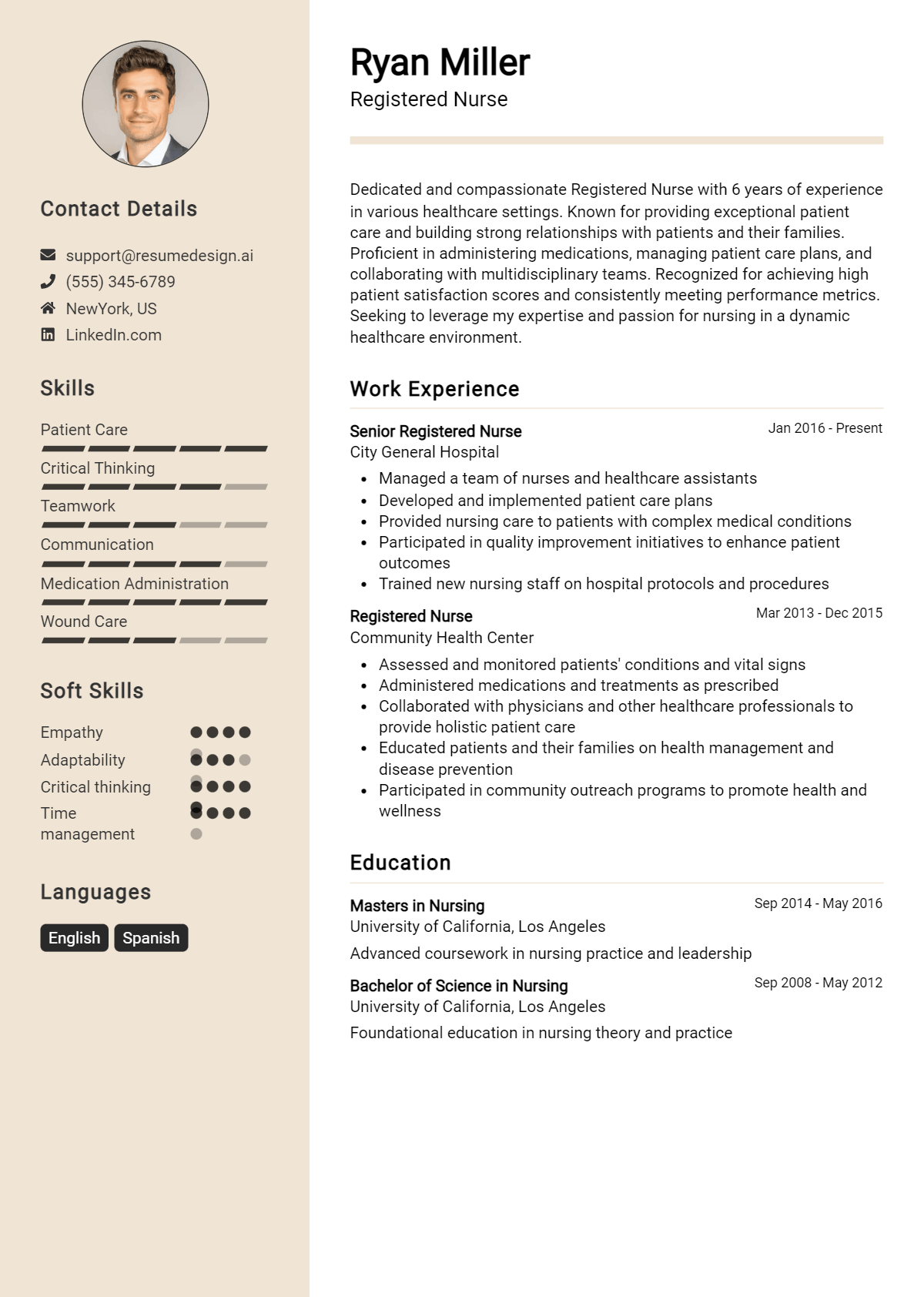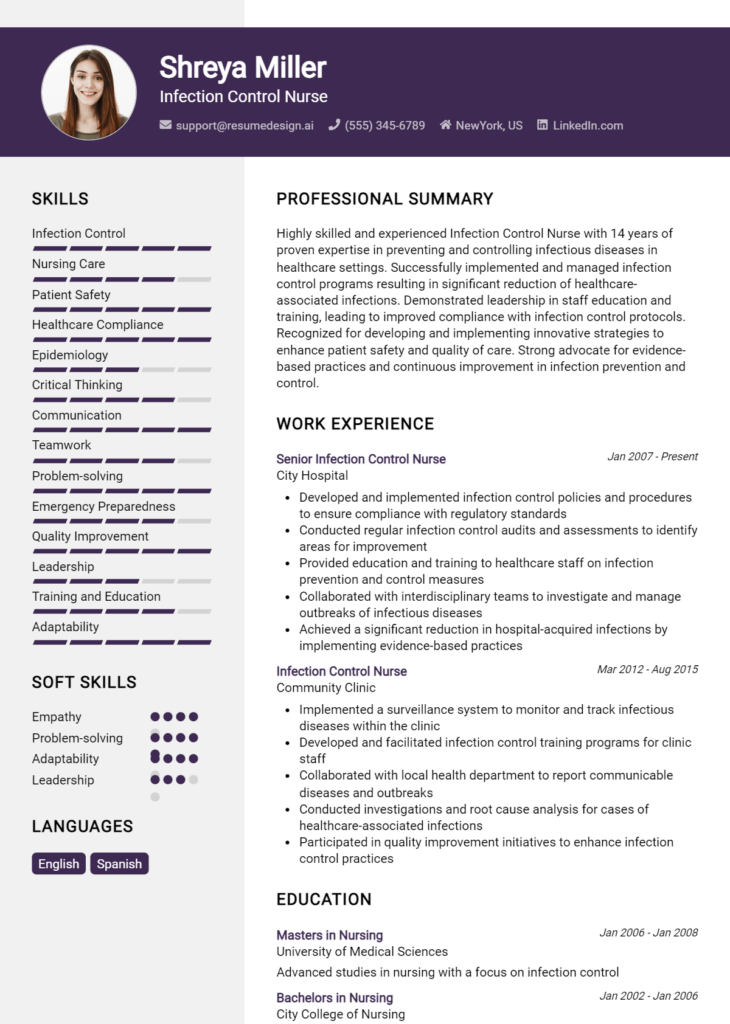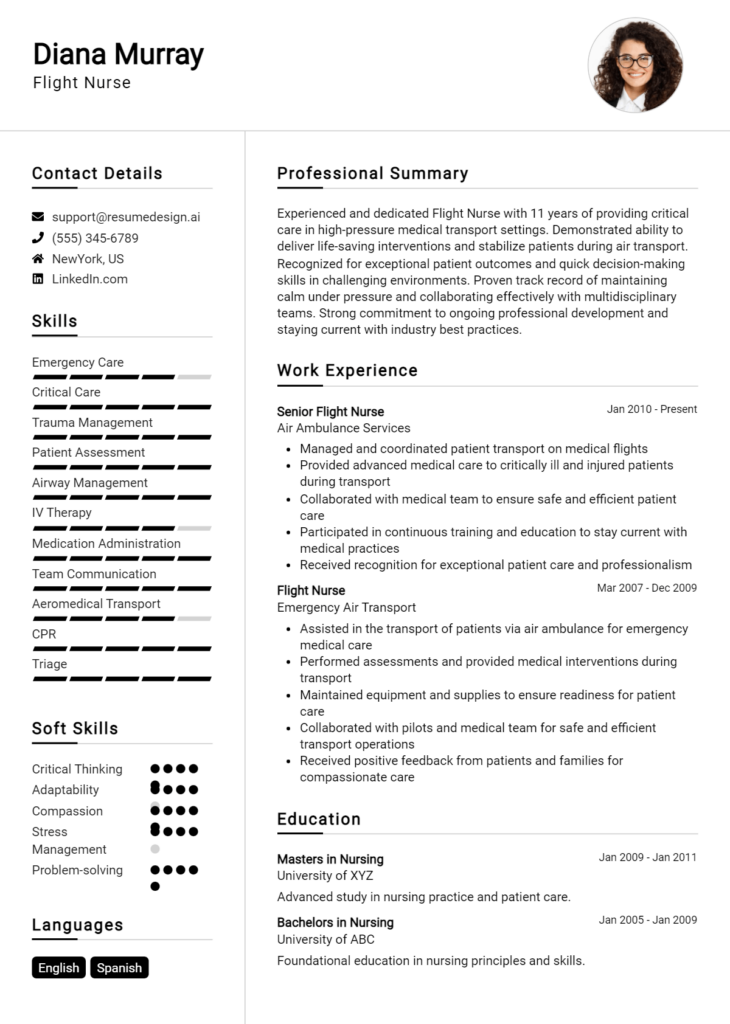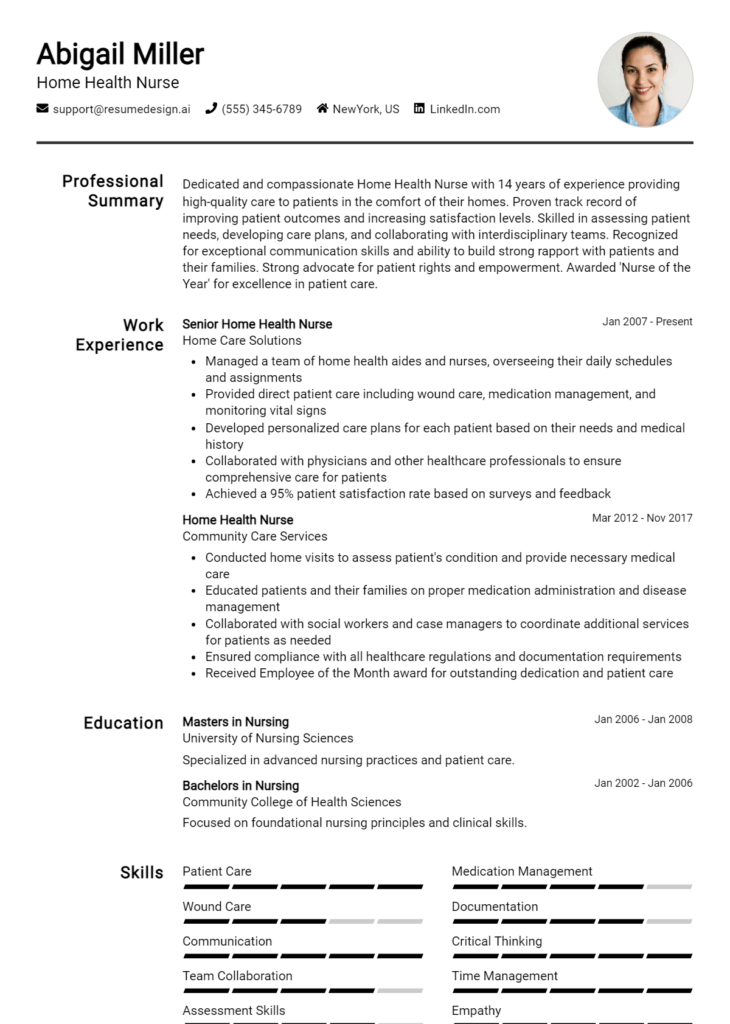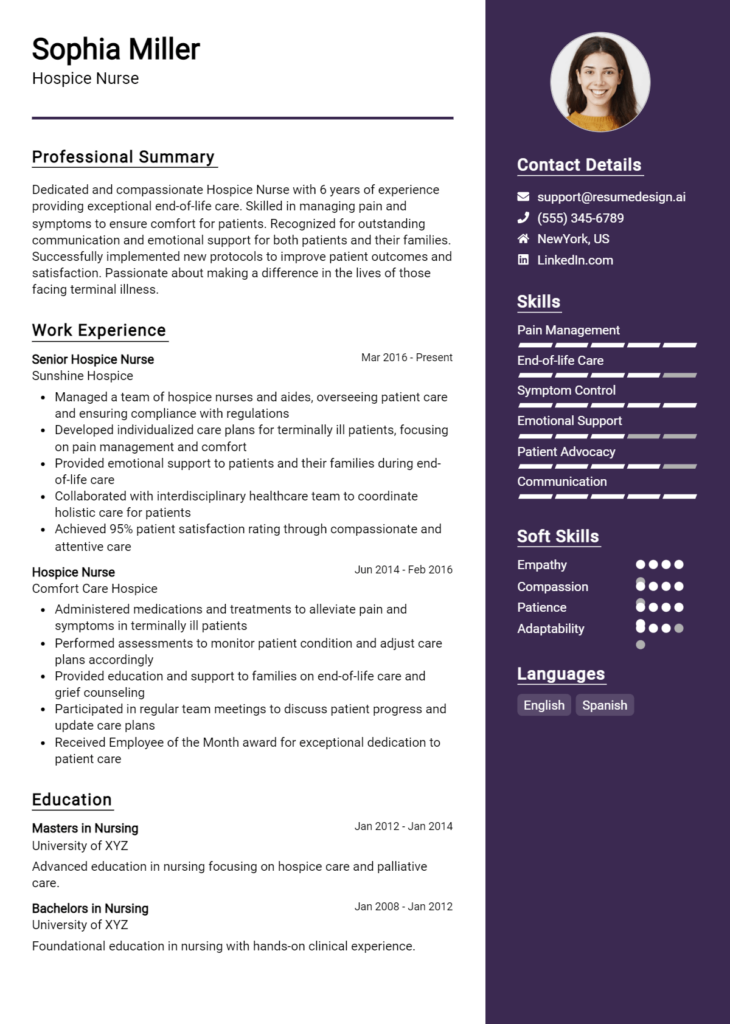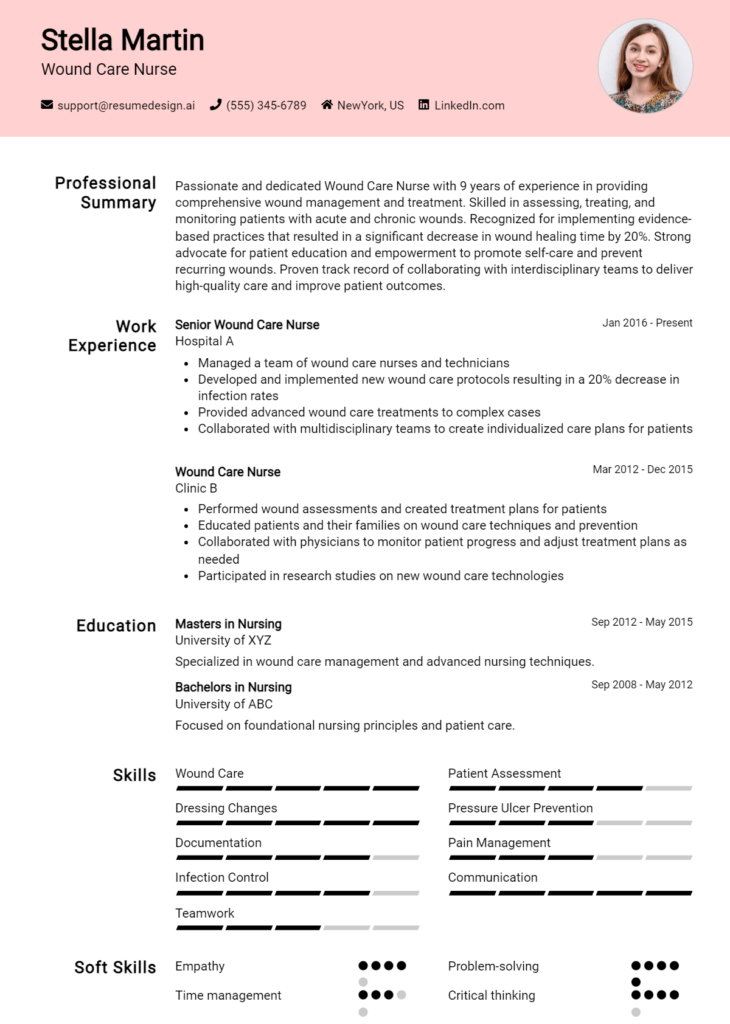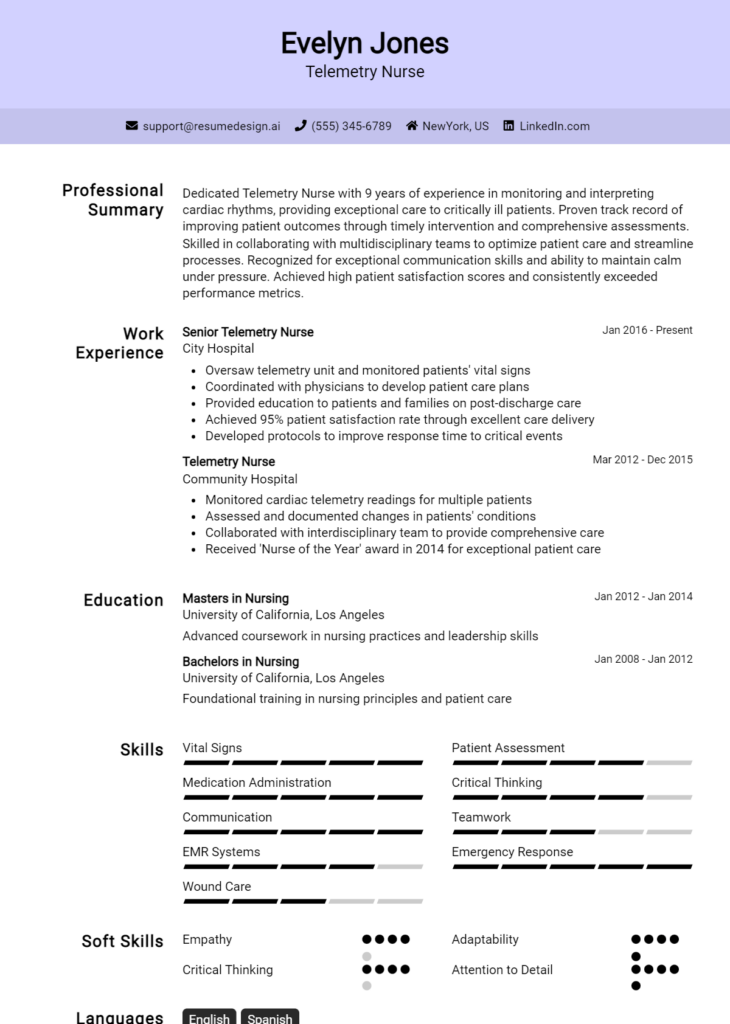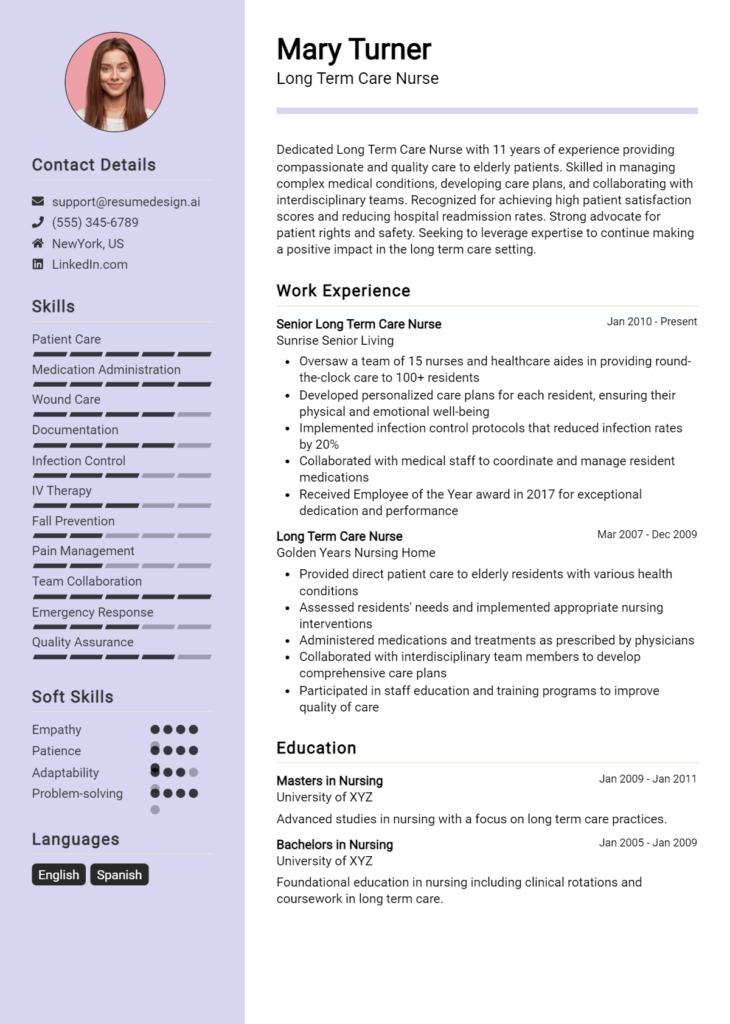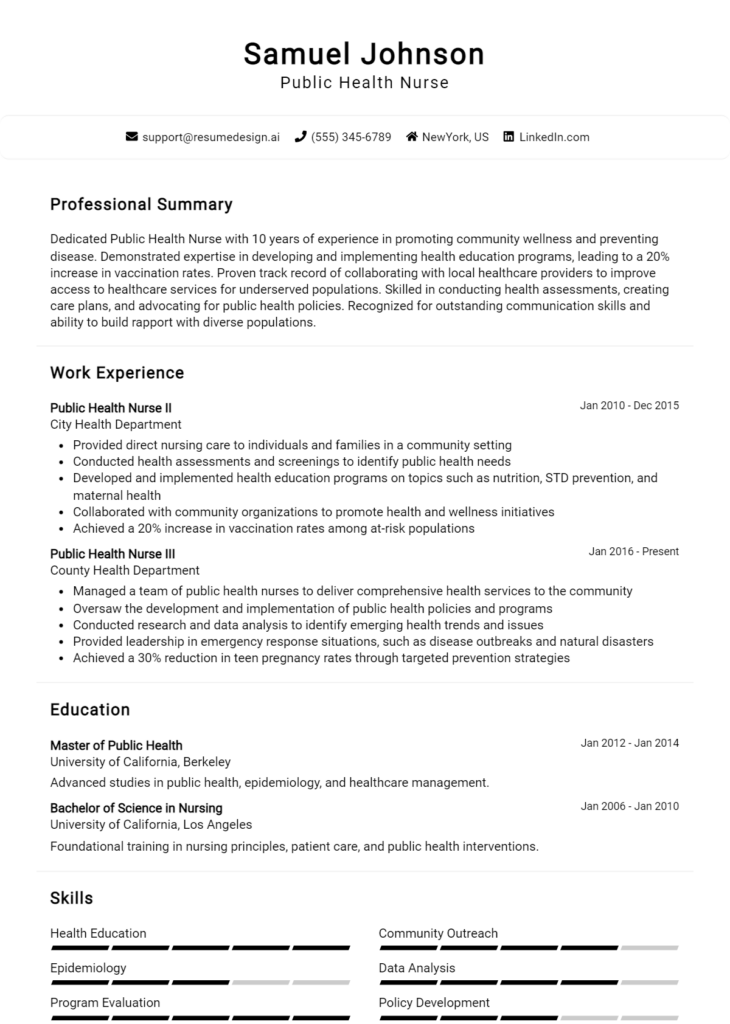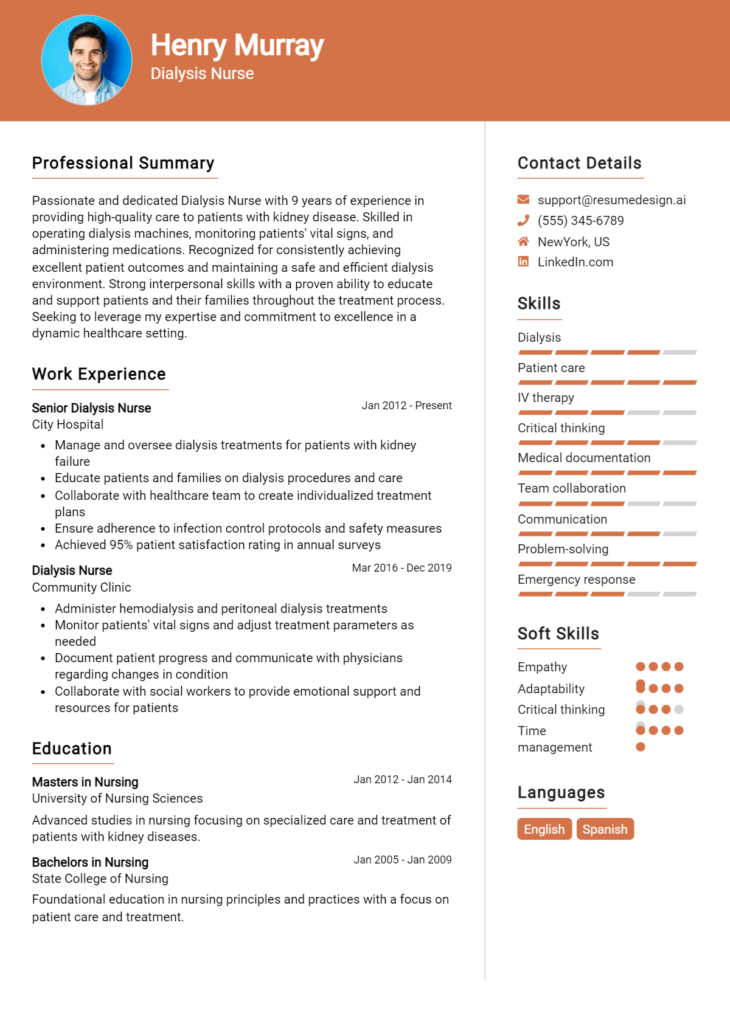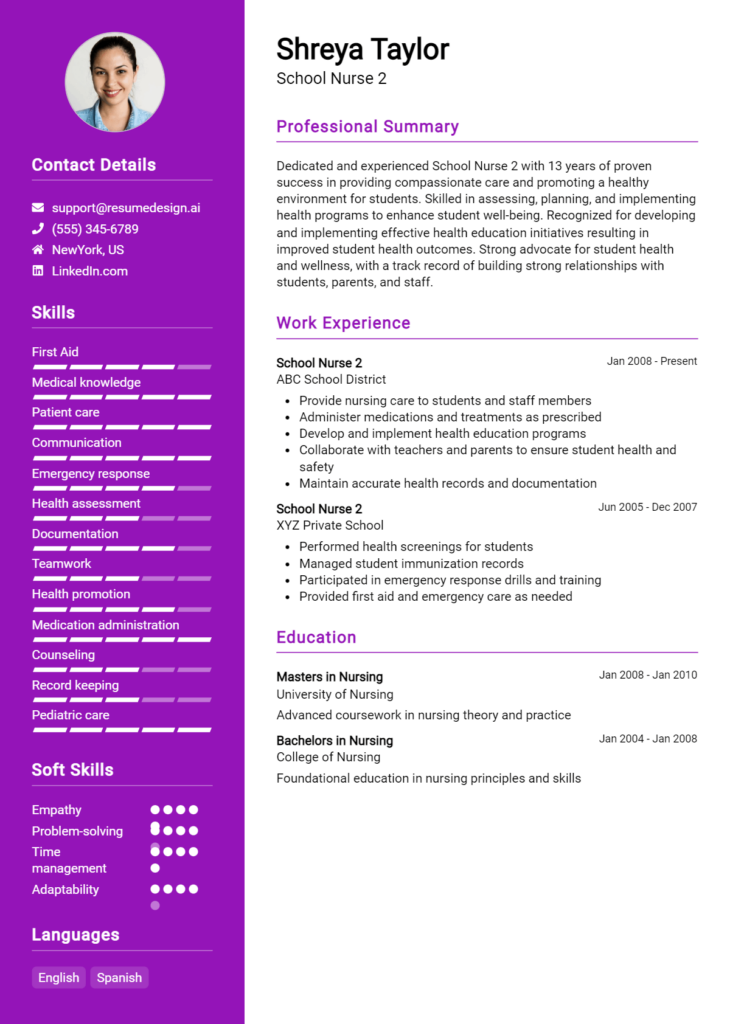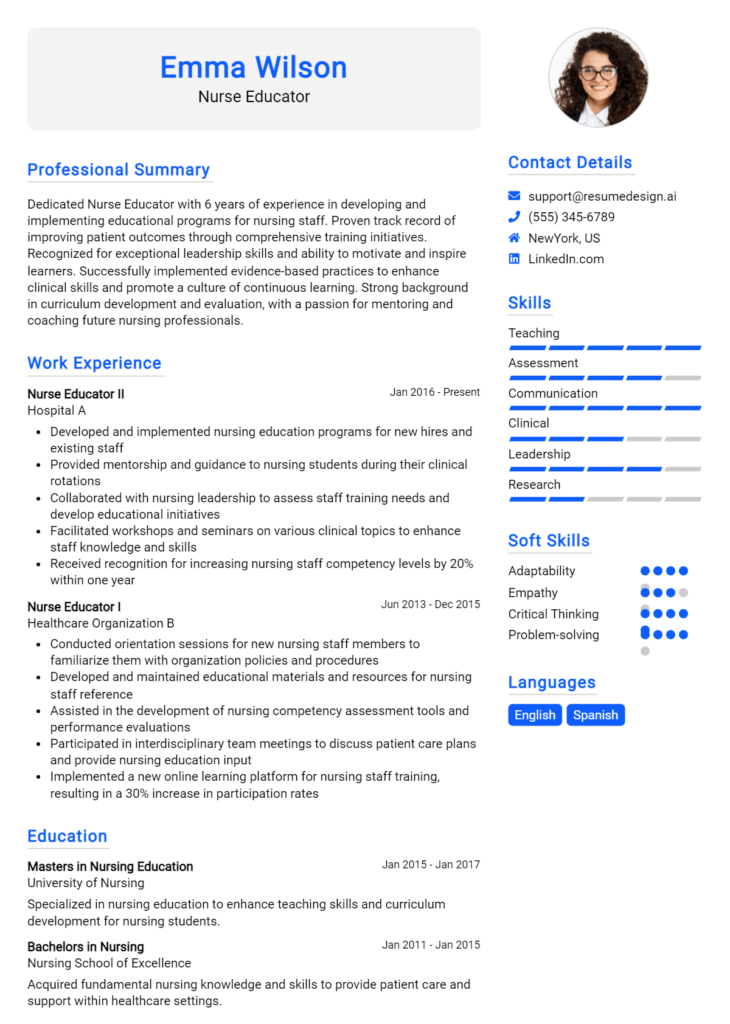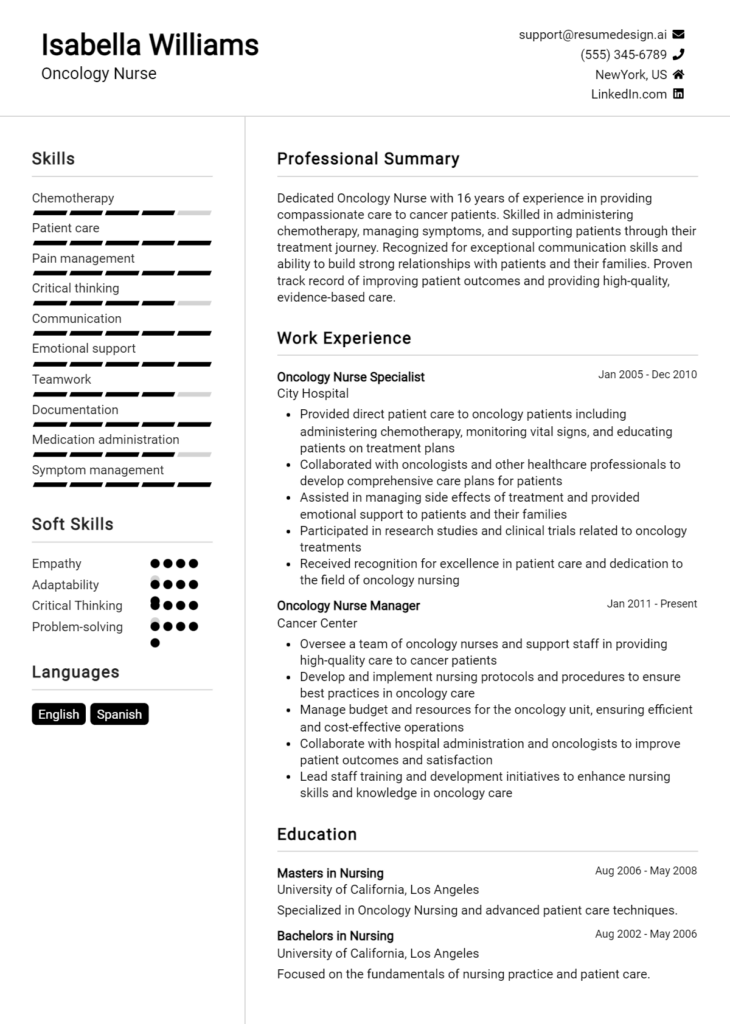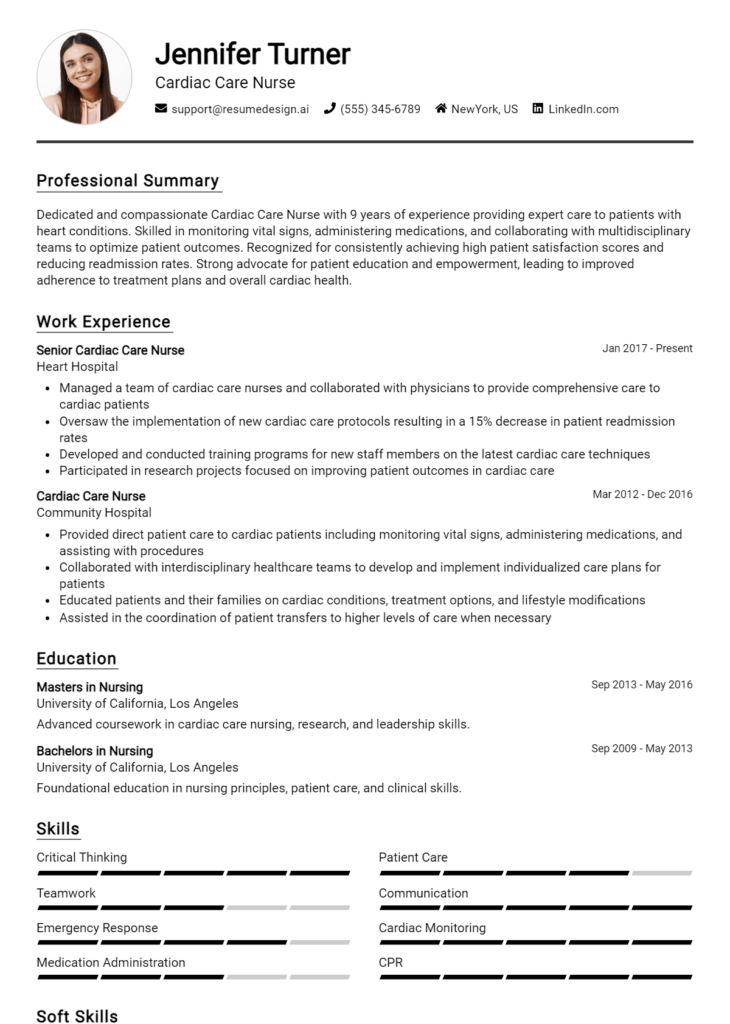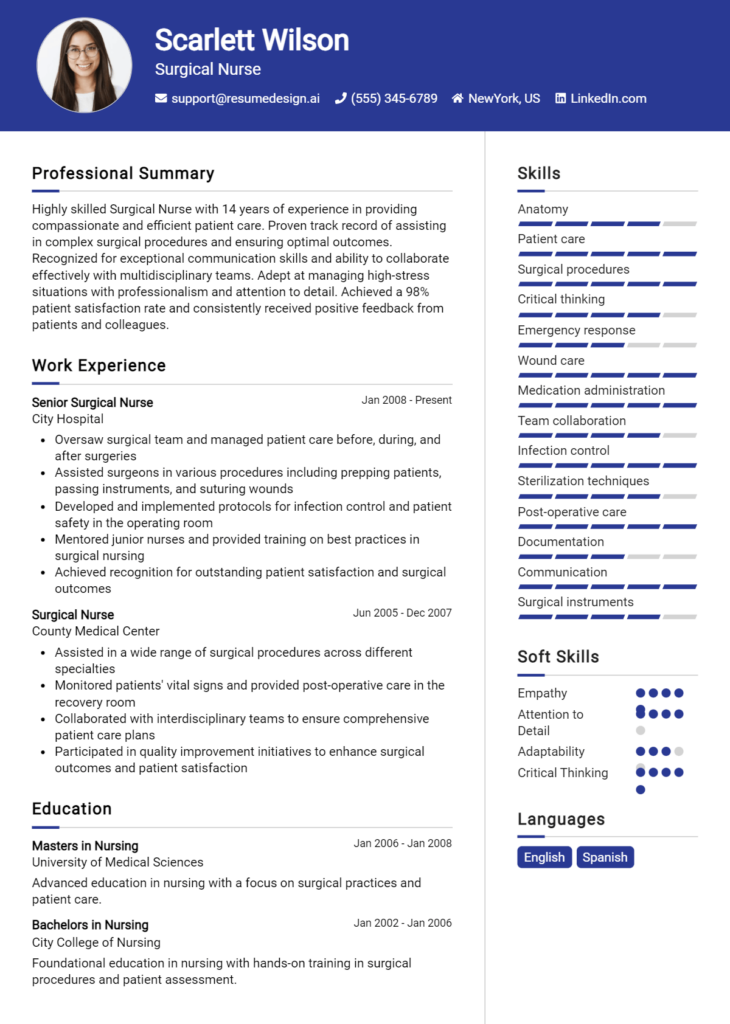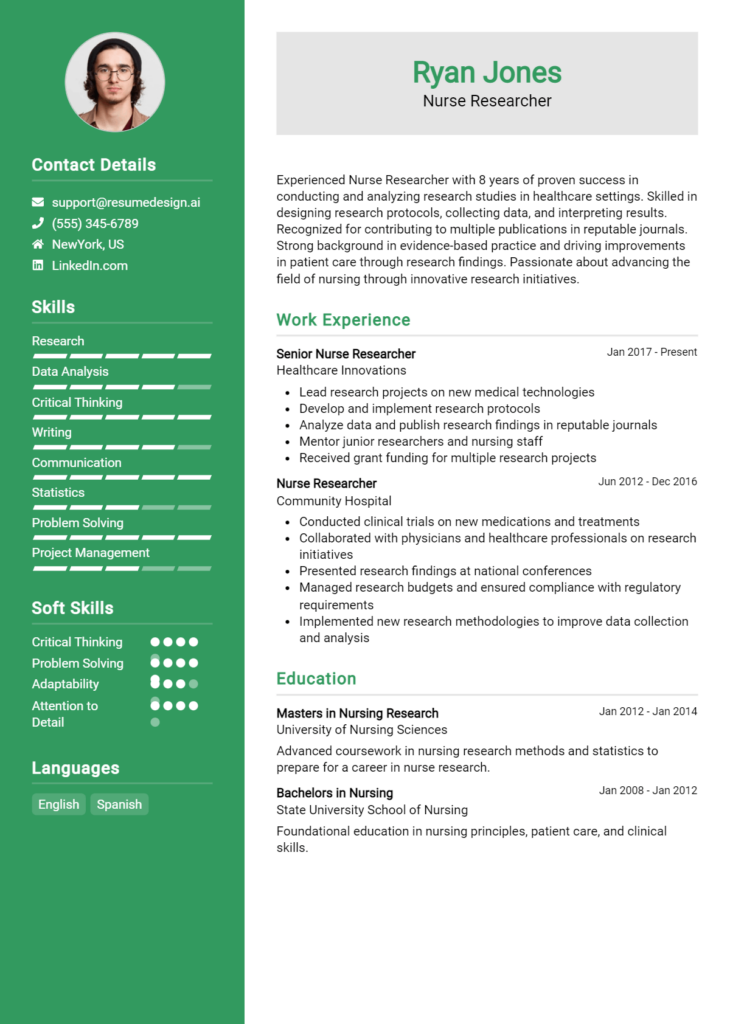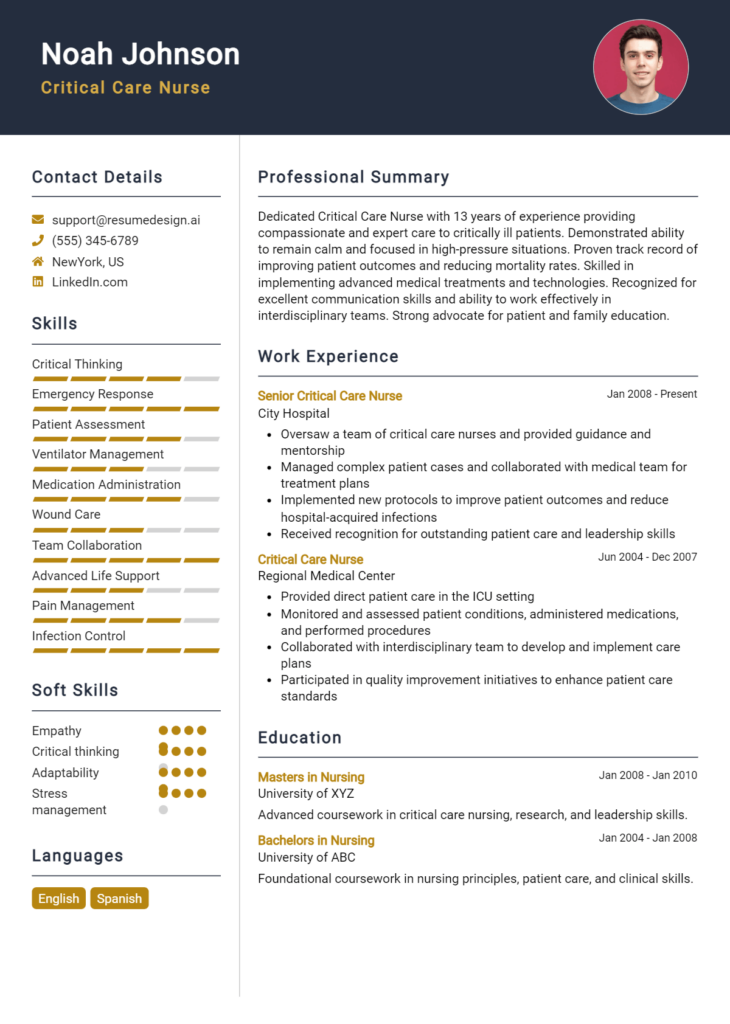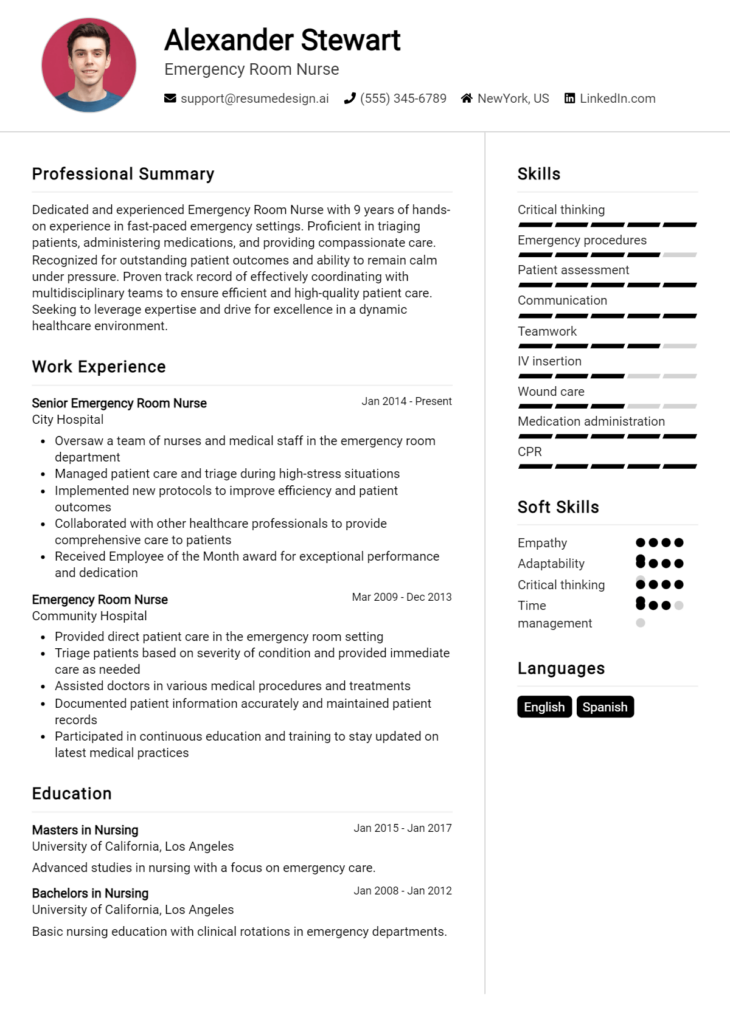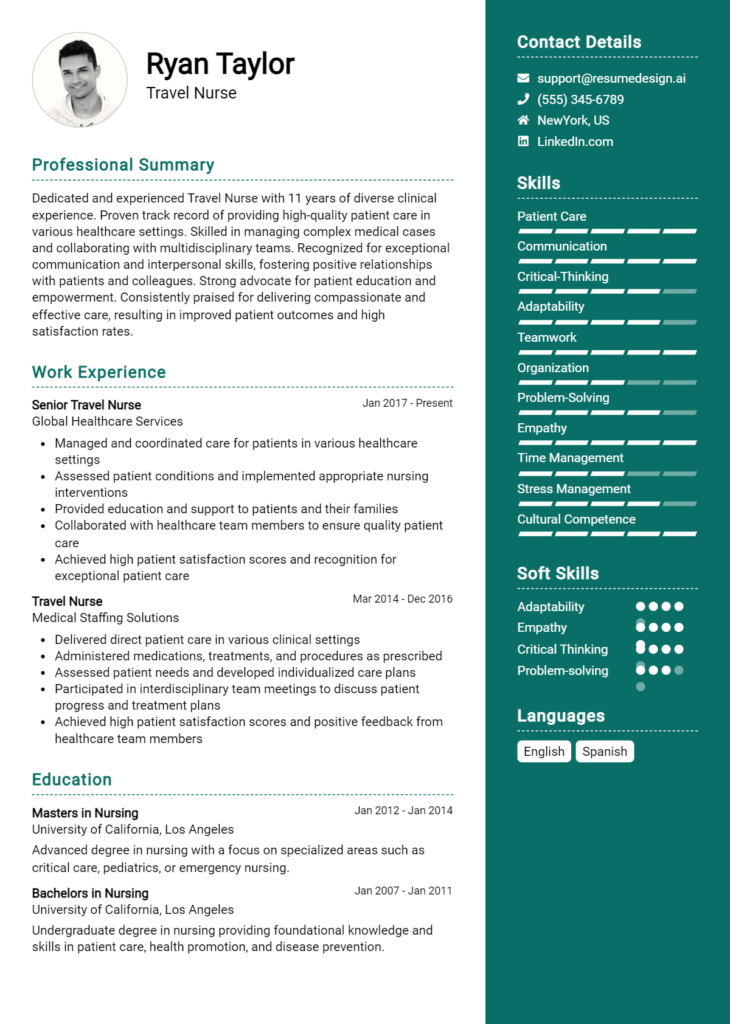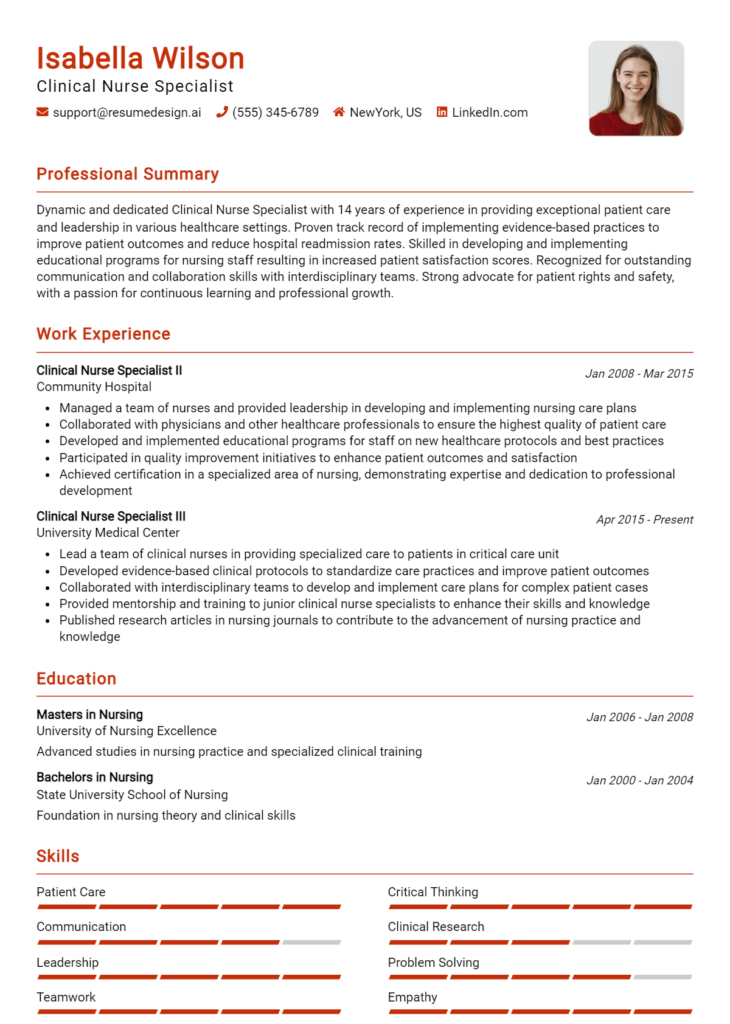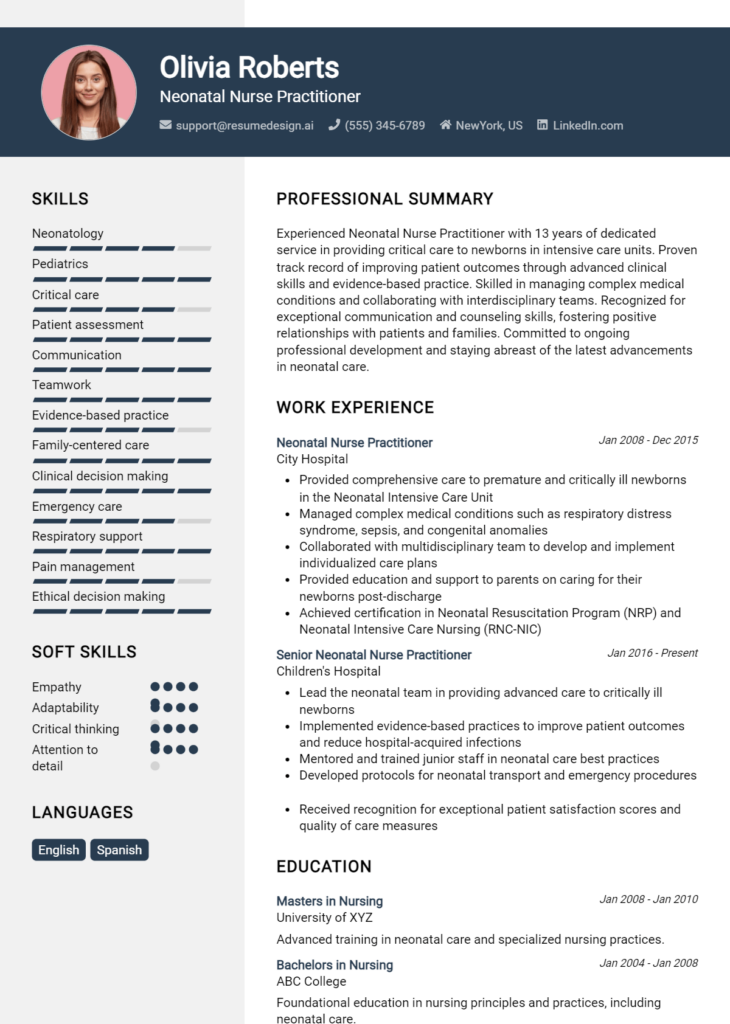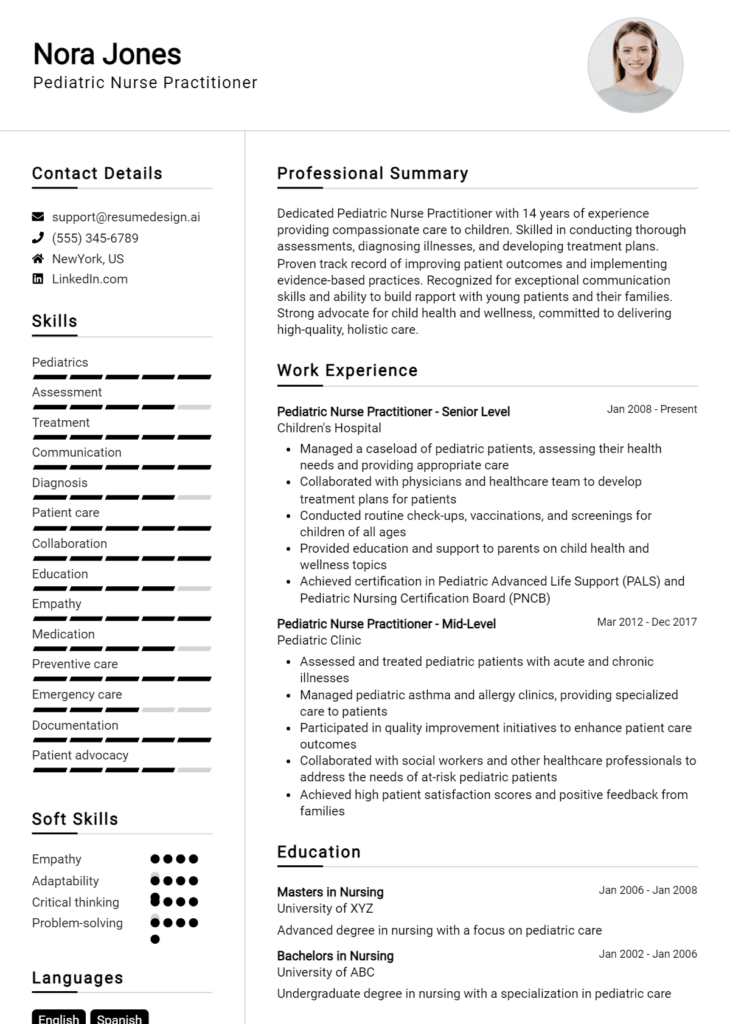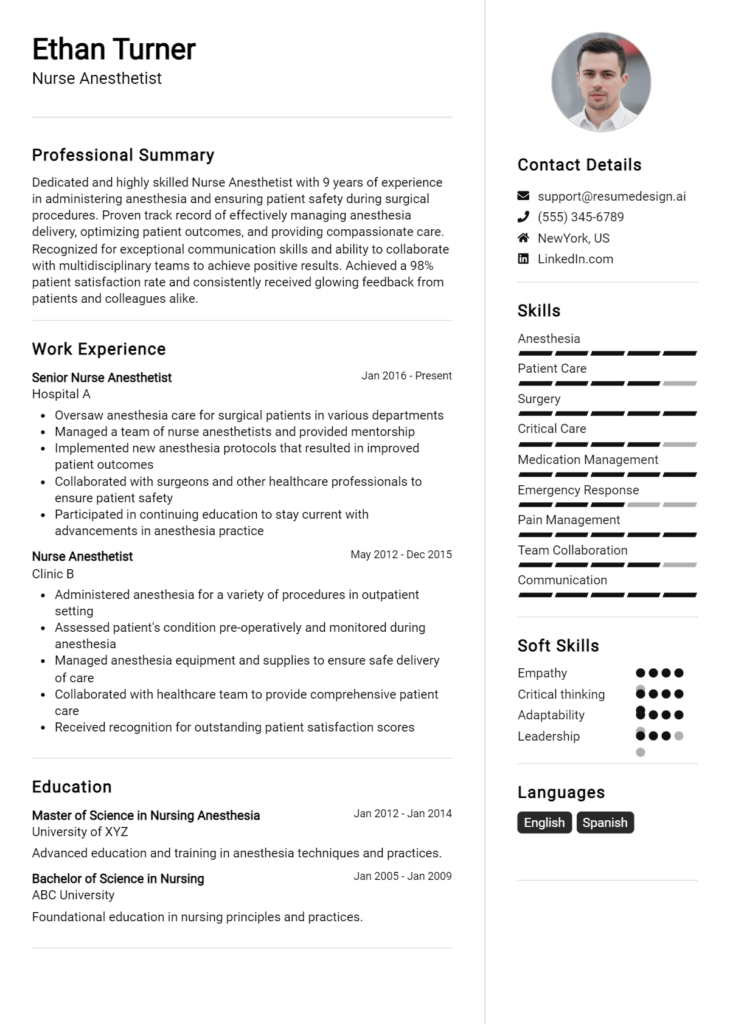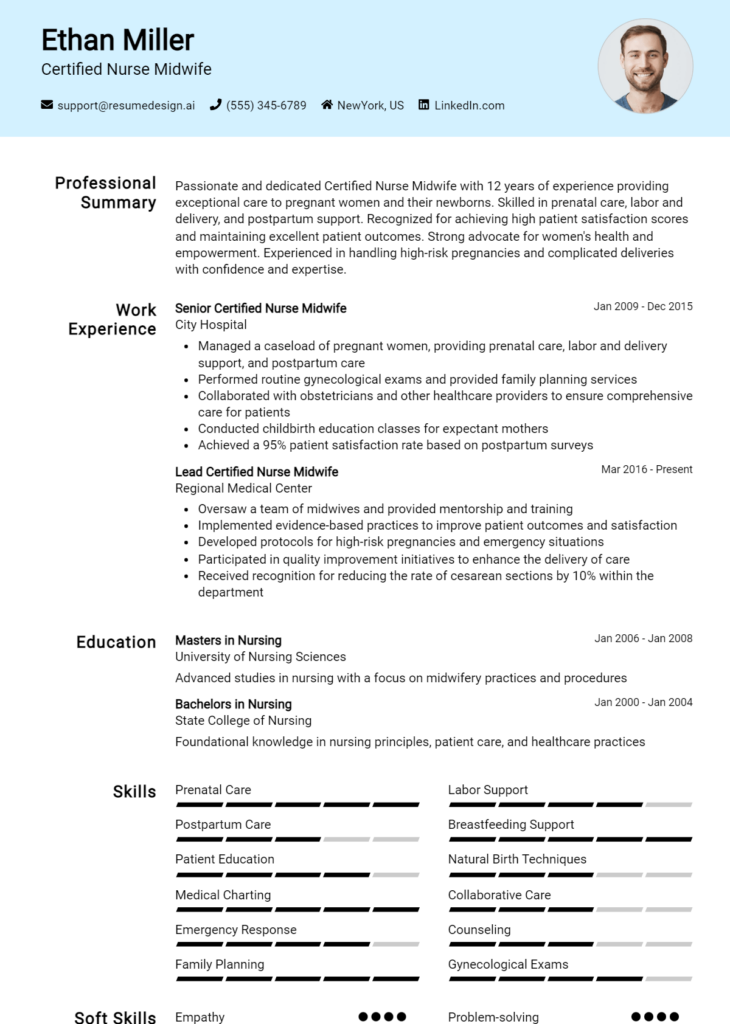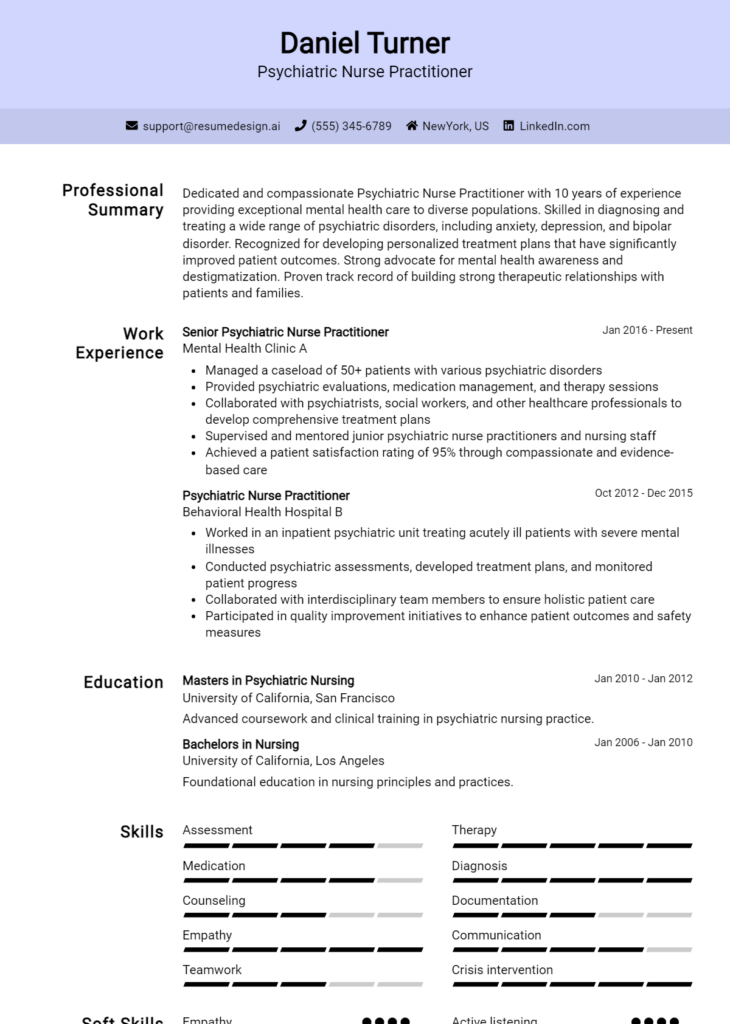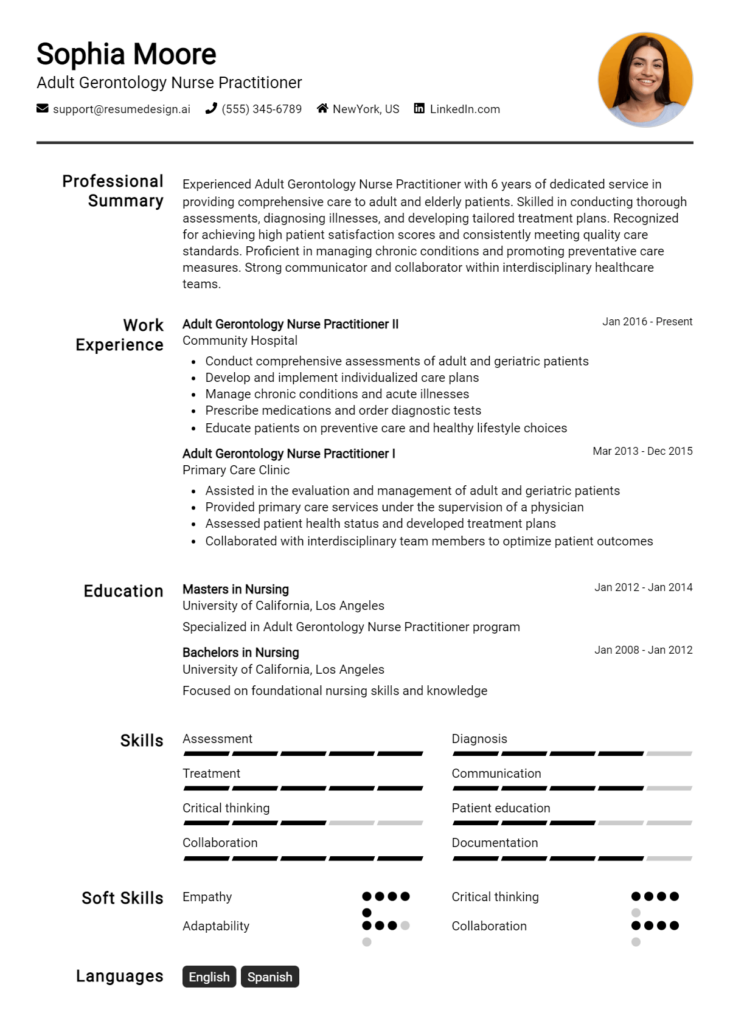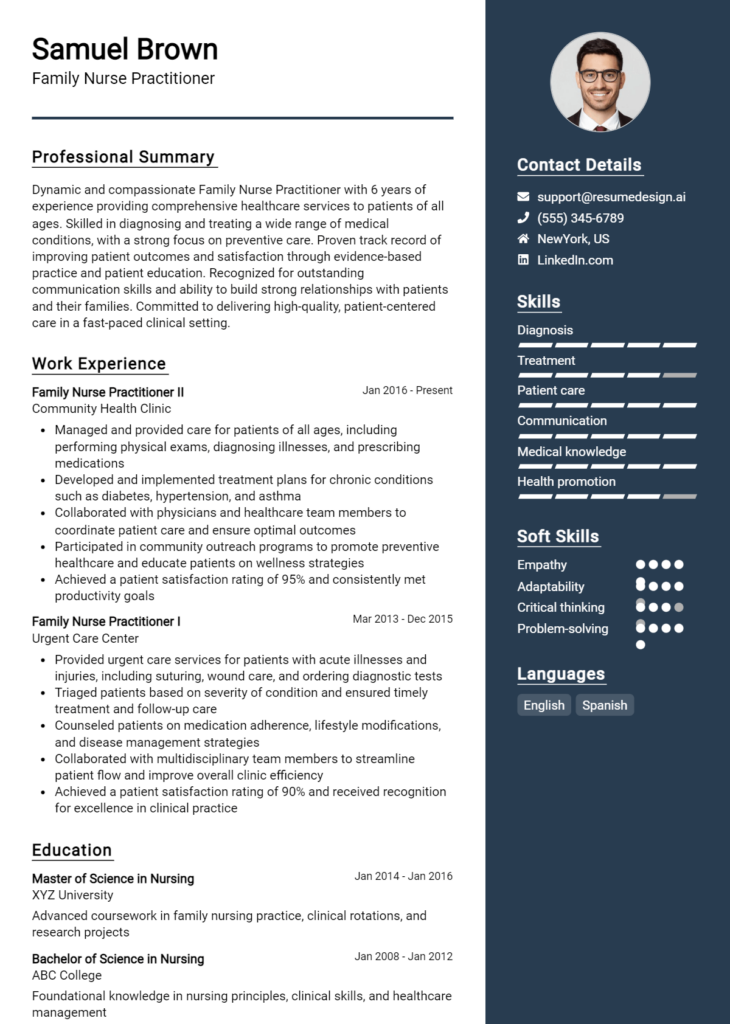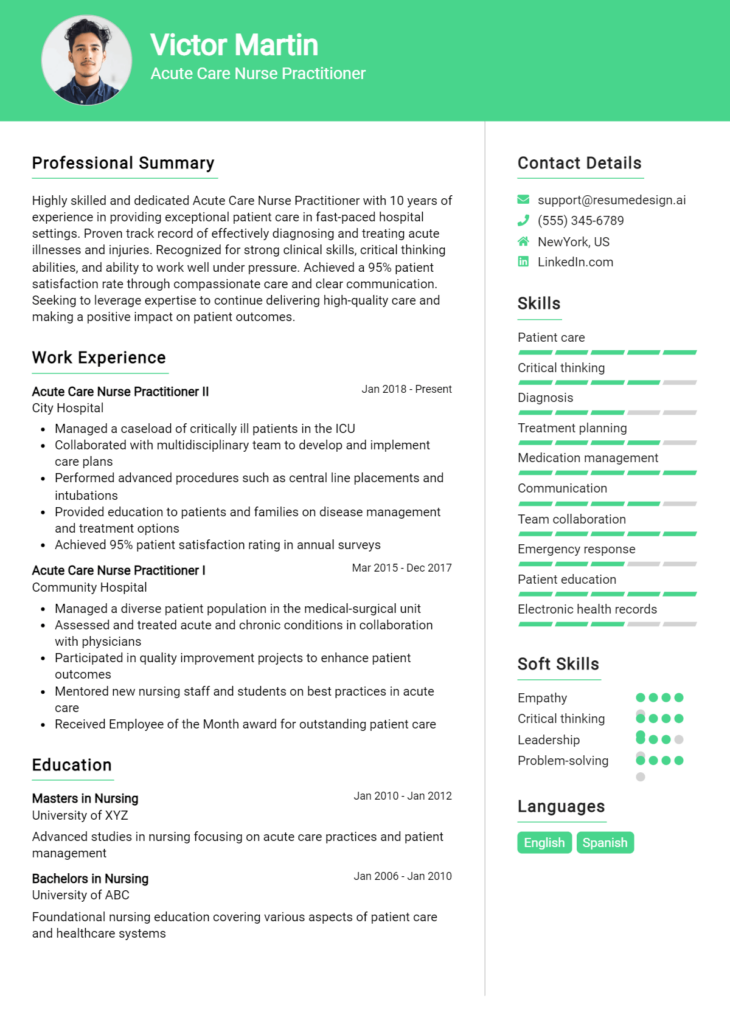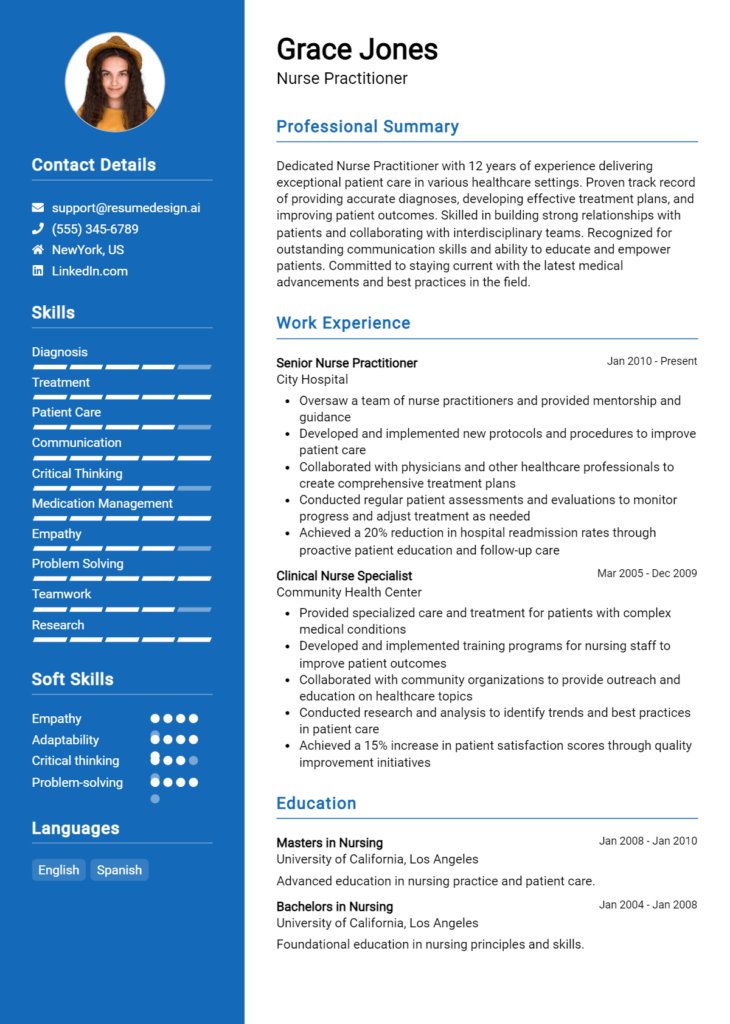Registered Nurse Core Responsibilities
Registered Nurses play a crucial role in healthcare, serving as a vital link between patients and various departments. Their core responsibilities include assessing patient needs, administering medications, collaborating with multidisciplinary teams, and coordinating care plans. Essential skills such as technical proficiency, operational awareness, and strong problem-solving abilities are necessary for success in this role. These competencies not only enhance patient outcomes but also align with the organization’s goals. A well-structured resume can effectively highlight these qualifications, showcasing a candidate's potential to contribute meaningfully to the healthcare team.
Common Responsibilities Listed on Registered Nurse Resume
- Conducting patient assessments and monitoring vital signs
- Administering medications and treatments as prescribed
- Collaborating with healthcare teams to develop care plans
- Educating patients and families about health management
- Maintaining accurate patient records and documentation
- Assisting with diagnostic tests and procedures
- Providing emotional support and counseling to patients
- Ensuring compliance with healthcare regulations and standards
- Participating in quality improvement initiatives
- Managing patient flow and coordinating care transitions
- Responding to medical emergencies with swift action
- Mentoring and training new nursing staff
High-Level Resume Tips for Registered Nurse Professionals
In the competitive landscape of healthcare, a well-crafted resume is essential for Registered Nurse professionals seeking to make a lasting impression on potential employers. Your resume serves as the first point of contact with hiring managers, encapsulating not just your skills and qualifications, but also your unique achievements and experiences within the nursing field. An impactful resume can set you apart from other candidates, showcasing your dedication to patient care and your capacity to thrive in dynamic healthcare environments. This guide aims to provide practical and actionable resume tips specifically tailored for Registered Nurse professionals to help you present your best self to prospective employers.
Top Resume Tips for Registered Nurse Professionals
- Tailor your resume to match the job description by incorporating relevant keywords and phrases.
- Highlight your clinical experience prominently, emphasizing specific departments or specialties you have worked in.
- Quantify your achievements where possible, using metrics such as patient outcomes, reduced wait times, or improved patient satisfaction scores.
- Showcase certifications and licenses, ensuring they are up-to-date and relevant to the position you’re applying for.
- Include a strong summary statement at the top that encapsulates your core competencies and career goals.
- Highlight your soft skills, such as communication, empathy, and teamwork, which are crucial in nursing roles.
- Utilize bullet points for clarity and to make your resume easier to scan quickly by hiring managers.
- Keep the formatting clean and professional, using consistent fonts and sizes to enhance readability.
- Incorporate continuing education and professional development to demonstrate commitment to your nursing career.
- Proofread carefully to eliminate any grammatical or typographical errors, as attention to detail is vital in nursing.
By implementing these tips, you can significantly enhance your resume, making it a powerful tool in your job search. A well-optimized resume not only showcases your qualifications but also reflects your professionalism and readiness for the challenges of the Registered Nurse role, ultimately increasing your chances of landing that coveted position in the healthcare field.
Why Resume Headlines & Titles are Important for Registered Nurse
In the competitive field of nursing, a well-crafted resume headline or title serves as a powerful tool for Registered Nurses looking to make a strong first impression. A compelling headline can immediately grab the attention of hiring managers, summarizing a candidate's key qualifications and strengths in a single, impactful phrase. An effective resume headline should be concise, relevant, and directly related to the specific job being applied for, allowing potential employers to quickly assess the candidate's suitability for the position.
Best Practices for Crafting Resume Headlines for Registered Nurse
- Keep it concise: Aim for one clear and impactful sentence.
- Be role-specific: Tailor the headline to reflect the specific nursing position.
- Highlight key skills: Focus on essential skills and certifications relevant to the job.
- Use action-oriented language: Employ strong verbs to convey competence and confidence.
- Include years of experience: Mention your experience level if it is significant to the role.
- Avoid clichés: Stay away from vague phrases that don't add value.
- Showcase achievements: If applicable, reference notable accomplishments that set you apart.
- Maintain professionalism: Ensure the tone is appropriate for the healthcare environment.
Example Resume Headlines for Registered Nurse
Strong Resume Headlines
Compassionate Registered Nurse with 5 Years of Experience in Pediatric Care
Dedicated ICU Nurse with Proven Record in Emergency Response and Patient Recovery
Bilingual Registered Nurse Specializing in Patient Education and Community Health
Weak Resume Headlines
Nurse Looking for a Job
Healthcare Professional Seeking Opportunities
The strong headlines are effective because they provide specific information about the candidate's experience and skills, making it easy for hiring managers to understand their qualifications at a glance. In contrast, the weak headlines fail to impress due to their vagueness and lack of detail, leaving employers without a clear understanding of what the candidate offers. A strong resume headline can set the tone for the entire application, making it essential for Registered Nurses to invest time in crafting one that stands out.
Writing an Exceptional Registered Nurse Resume Summary
A well-crafted resume summary is essential for Registered Nurses seeking to make a strong impression on hiring managers. This brief introductory paragraph serves as the first point of contact, quickly capturing attention by highlighting key skills, relevant experience, and notable accomplishments. A compelling summary not only showcases the candidate's qualifications but also sets the tone for the rest of the resume. It should be concise, impactful, and tailored specifically to the job being applied for, making it easier for employers to see the value the candidate brings to their healthcare team.
Best Practices for Writing a Registered Nurse Resume Summary
- Quantify achievements: Use numbers to demonstrate the impact of your work, such as patient outcomes or efficiency improvements.
- Focus on key skills: Highlight essential nursing skills that are relevant to the job description.
- Tailor for the job: Customize your summary to align with the specific requirements and responsibilities of the position.
- Use strong action verbs: Start sentences with powerful verbs that convey your contributions and expertise.
- Highlight certifications: Mention any relevant certifications or special training that enhance your qualifications.
- Keep it concise: Aim for 3-5 sentences that deliver maximum impact without overwhelming detail.
- Showcase soft skills: Include interpersonal skills that are critical in nursing, such as empathy and communication.
- Reflect your passion: Convey your dedication to patient care and the nursing profession to create a personal connection.
Example Registered Nurse Resume Summaries
Strong Resume Summaries
Compassionate Registered Nurse with over 5 years of experience in fast-paced emergency departments. Successfully managed a patient load of up to 10 individuals per shift while maintaining a 98% patient satisfaction rating. Certified in Advanced Cardiac Life Support (ACLS) and proficient in electronic health record (EHR) systems.
Dedicated and detail-oriented Registered Nurse with a proven track record of improving patient outcomes by 20% through implementation of evidence-based care practices. Skilled in critical care nursing with a focus on trauma and cardiovascular patients. Holds a BSN and is a member of the American Nurses Association.
Proficient Registered Nurse with 7 years of experience in pediatric nursing, specializing in chronic illness management. Recognized for reducing hospital readmission rates by 15% through effective patient education and follow-up care. BLS and PALS certified.
Weak Resume Summaries
Registered Nurse with experience in various healthcare settings looking for a new job. I like helping patients and have good communication skills.
Nursing professional with several years of experience interested in a nursing position. I am committed to providing quality care and working well with others.
The examples provided illustrate the difference between strong and weak resume summaries. Strong summaries are specific, quantifiable, and tailored to the nursing role, showcasing relevant skills and achievements that demonstrate the candidate's value. In contrast, weak summaries tend to be vague, lacking detail and measurable outcomes, which makes it difficult for hiring managers to gauge the candidate's expertise and suitability for the role.
Work Experience Section for Registered Nurse Resume
The work experience section of a Registered Nurse resume is a critical component that allows candidates to effectively showcase their technical skills, leadership capabilities, and commitment to delivering high-quality patient care. This section serves as a platform for nurses to demonstrate their clinical expertise, ability to manage teams, and contribute to positive patient outcomes. By quantifying achievements and aligning their experience with industry standards, candidates can create a compelling narrative that captures the attention of potential employers and highlights their value in the healthcare setting.
Best Practices for Registered Nurse Work Experience
- Highlight relevant clinical skills and certifications specific to the nursing role.
- Quantify achievements using metrics, such as patient satisfaction scores or reduced readmission rates.
- Use action verbs to convey a sense of initiative and leadership in your roles.
- Focus on collaborative efforts with multidisciplinary teams to improve patient care.
- Tailor your experience to match the job description and required competencies.
- Include diverse experiences, such as volunteer work or specialized training, to showcase a well-rounded background.
- Keep descriptions concise and impactful to maintain the reader's attention.
- Regularly update this section to reflect your most recent and relevant experiences.
Example Work Experiences for Registered Nurse
Strong Experiences
- Led a team of 5 nurses in a quality improvement project that decreased patient readmission rates by 25% over six months.
- Implemented a new electronic health record system that improved patient documentation efficiency by 40%.
- Coordinated care for a diverse patient population, enhancing satisfaction scores by 15% through effective communication and personalized care plans.
- Trained and mentored new nursing staff, resulting in a 30% increase in team performance ratings within the first year.
Weak Experiences
- Worked in a hospital setting for several years.
- Assisted with patient care and management tasks.
- Participated in team meetings and discussions.
- Helped to maintain a clean and organized work environment.
The examples categorized as strong experiences are considered effective because they clearly demonstrate quantifiable outcomes, showcase technical leadership, and highlight collaboration within healthcare teams. In contrast, the weak experiences lack specificity and measurable results, making them less impactful and failing to convey the candidate's contributions and skill level within the nursing profession.
Education and Certifications Section for Registered Nurse Resume
The education and certifications section of a Registered Nurse resume is crucial as it serves to showcase the candidate's academic background and professional credentials that are essential for the role. This section not only reflects the nursing degree attained but also emphasizes industry-relevant certifications and ongoing education efforts that demonstrate a commitment to professional development. By including relevant coursework, specialized training, and certifications, candidates can significantly enhance their credibility, illustrating their preparedness and alignment with the demands of the nursing profession.
Best Practices for Registered Nurse Education and Certifications
- Include your highest degree first, followed by relevant certifications.
- List only those certifications that are current and applicable to the nursing role.
- Highlight specialized training that aligns with the job description or the healthcare facility's focus.
- Provide details on relevant coursework, particularly if it pertains to advanced practice or specialized areas of nursing.
- Clearly indicate the dates of completion for degrees and certifications to demonstrate ongoing education.
- Use a clean and organized format that allows easy scanning of information.
- Incorporate industry-recognized certifications to stand out among other candidates.
- Tailor the section to match the job description, emphasizing the most pertinent qualifications.
Example Education and Certifications for Registered Nurse
Strong Examples
- Bachelor of Science in Nursing (BSN), University of Health Sciences, 2020
- Certified Critical Care Nurse (CCRN), American Association of Critical-Care Nurses, 2022
- Advanced Cardiac Life Support (ACLS), American Heart Association, Current
- Pediatric Advanced Life Support (PALS), American Heart Association, Current
Weak Examples
- Associate Degree in Nursing (ADN), Community College, 2015
- Basic Life Support (BLS), expired 2021
- Certificate in Medical Billing and Coding, 2018
- High School Diploma, 2010
The examples provided illustrate the distinction between strong and weak entries in the education and certifications section. Strong examples are directly relevant to the nursing profession, showcasing advanced degrees and current certifications that align with essential nursing competencies. In contrast, weak examples include outdated or irrelevant qualifications that do not contribute to the candidate's suitability for the nursing role, such as expired certifications or unrelated fields of study. Highlighting strong examples enhances a candidate's prospects in the competitive nursing job market.
Top Skills & Keywords for Registered Nurse Resume
As a Registered Nurse, showcasing the right skills on your resume is vital to stand out in a competitive job market. Employers are not only looking for clinical expertise but also for the interpersonal abilities that facilitate effective patient care and collaboration within healthcare teams. The skills you highlight can demonstrate your ability to handle the demands of the role, conveying your professionalism and capacity to provide compassionate care. A well-structured resume that emphasizes both hard and soft skills can significantly enhance your chances of landing the desired position. For more details on how to effectively display your skills and work experience, keep reading.
Top Hard & Soft Skills for Registered Nurse
Soft Skills
- Empathy
- Communication
- Teamwork
- Problem-solving
- Adaptability
- Attention to detail
- Time management
- Critical thinking
- Stress management
- Patient advocacy
- Cultural competence
- Conflict resolution
- Leadership
- Compassion
- Active listening
Hard Skills
- Patient assessment
- IV therapy
- Medication administration
- Wound care
- Electronic Health Records (EHR) management
- Vital sign monitoring
- CPR and first aid certification
- Infection control
- Care plan development
- Health education
- Medical terminology
- Basic life support (BLS)
- Advanced cardiac life support (ACLS)
- Blood draw and lab testing
- Charting and documentation
- Health informatics
- Clinical trial management
- Radiology and imaging procedures
Stand Out with a Winning Registered Nurse Cover Letter
As a dedicated and compassionate registered nurse with over five years of experience in diverse healthcare settings, I am excited to apply for the nursing position at [Hospital/Clinic Name]. My extensive clinical background, combined with a proven ability to provide high-quality patient care, makes me an ideal candidate for your team. I am particularly drawn to [Hospital/Clinic Name] because of its commitment to patient-centered care and continuous improvement, values that align with my own professional philosophy.
In my previous role at [Previous Employer], I successfully managed a caseload of patients in a fast-paced environment while ensuring the highest standards of care. I excelled in performing comprehensive assessments, developing individualized care plans, and collaborating with interdisciplinary teams to optimize patient outcomes. My hands-on experience in critical care and my passion for educating patients and their families about health management have equipped me with the skills necessary to handle complex patient situations with confidence and empathy.
Moreover, my dedication to professional development has led me to pursue additional certifications in [specific area, e.g., cardiac care, pediatrics], which have further enhanced my clinical expertise. I am adept at utilizing advanced nursing technologies and evidence-based practices to improve patient care and streamline processes. I believe that my proactive approach to problem-solving and my ability to remain calm under pressure will make a valuable contribution to the dynamic team at [Hospital/Clinic Name].
I am excited about the opportunity to bring my skills and experiences to [Hospital/Clinic Name]. I am confident that my commitment to excellence in nursing care and my passion for making a difference in patients' lives will enable me to thrive in your esteemed facility. Thank you for considering my application. I look forward to the possibility of discussing how I can contribute to the outstanding care provided by your team.
Common Mistakes to Avoid in a Registered Nurse Resume
Crafting a compelling resume is crucial for Registered Nurses looking to stand out in a competitive job market. However, many candidates make common mistakes that can hinder their chances of landing an interview. By avoiding these pitfalls, you can present a polished and professional resume that highlights your qualifications and experiences effectively. Here are some common mistakes to watch out for:
Generic Objective Statement: Using a vague objective that does not specifically relate to the nursing position can make your resume blend in with others. Tailor your objective to reflect your skills and aspirations relevant to the job.
Lack of Quantifiable Achievements: Failing to include specific metrics or achievements diminishes your impact. Instead of saying "managed patient care," specify "managed care for 20 patients daily, resulting in a 15% increase in patient satisfaction scores."
Ignoring the Job Description: Not customizing your resume for each job application can lead to missed opportunities. Use keywords from the job posting to align your experience with the employer's needs.
Overloading with Irrelevant Information: Including unrelated work experience or outdated skills detracts from your qualifications as a nurse. Focus on relevant nursing experience, certifications, and skills that directly relate to the job.
Poor Formatting and Layout: A cluttered or confusing format can make your resume difficult to read. Use clear headings, consistent fonts, and bullet points to create a clean, easy-to-navigate document.
Neglecting Continuing Education: Omitting ongoing education or certifications can signal to employers that you are not committed to professional development. Always include relevant courses, workshops, or certifications that enhance your nursing skills.
Spelling and Grammar Errors: Typos and grammatical mistakes can undermine your professionalism. Carefully proofread your resume or ask someone else to review it to ensure it is error-free.
Missing Contact Information: Forgetting to include your name, phone number, and email address can prevent employers from reaching you. Ensure your contact details are prominently displayed at the top of your resume.
Conclusion
As a Registered Nurse, your resume is a vital tool in showcasing your skills, experience, and dedication to patient care. Throughout this article, we explored the essential elements that make a strong RN resume, including the importance of tailoring your resume to specific job descriptions, highlighting your clinical competencies, and emphasizing your ability to work collaboratively in a healthcare team.
We also discussed common pitfalls to avoid, such as using generic language or omitting key achievements that set you apart from other candidates. Additionally, the significance of a well-structured format and error-free content cannot be overstated, as these factors greatly influence the first impression you make on potential employers.
Now is the perfect time to take a closer look at your Registered Nurse resume. Are you confident that it accurately reflects your qualifications and makes a compelling case for your candidacy? If you’re looking to enhance your resume or need a fresh start, consider utilizing the various tools available to you. Check out the resume templates to find a design that suits your style, or use the resume builder for an easy-to-use platform that guides you through the creation process.
Additionally, you can draw inspiration from resume examples that showcase successful Registered Nurse resumes. And don’t forget about the importance of a strong cover letter; explore the cover letter templates to complement your application.
Take action today to refine your resume and ensure it stands out in the competitive nursing job market!

